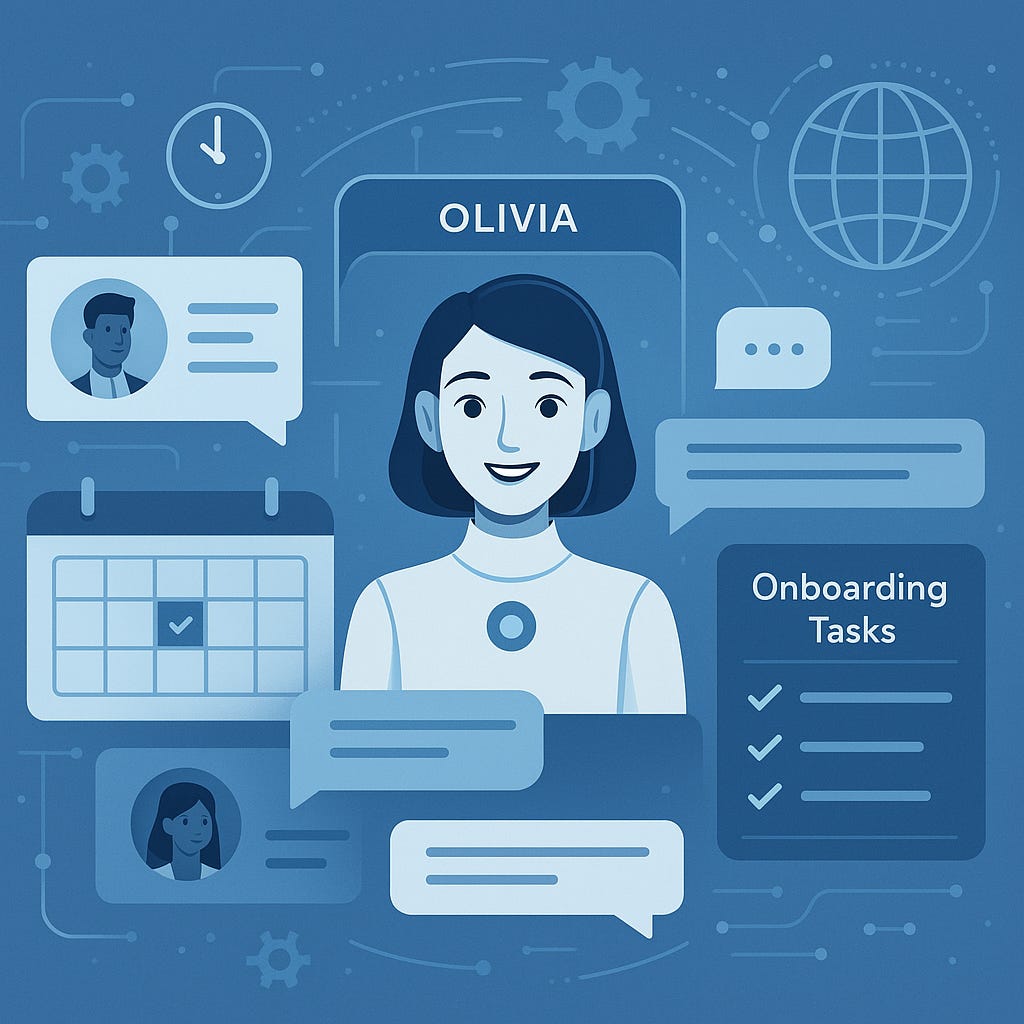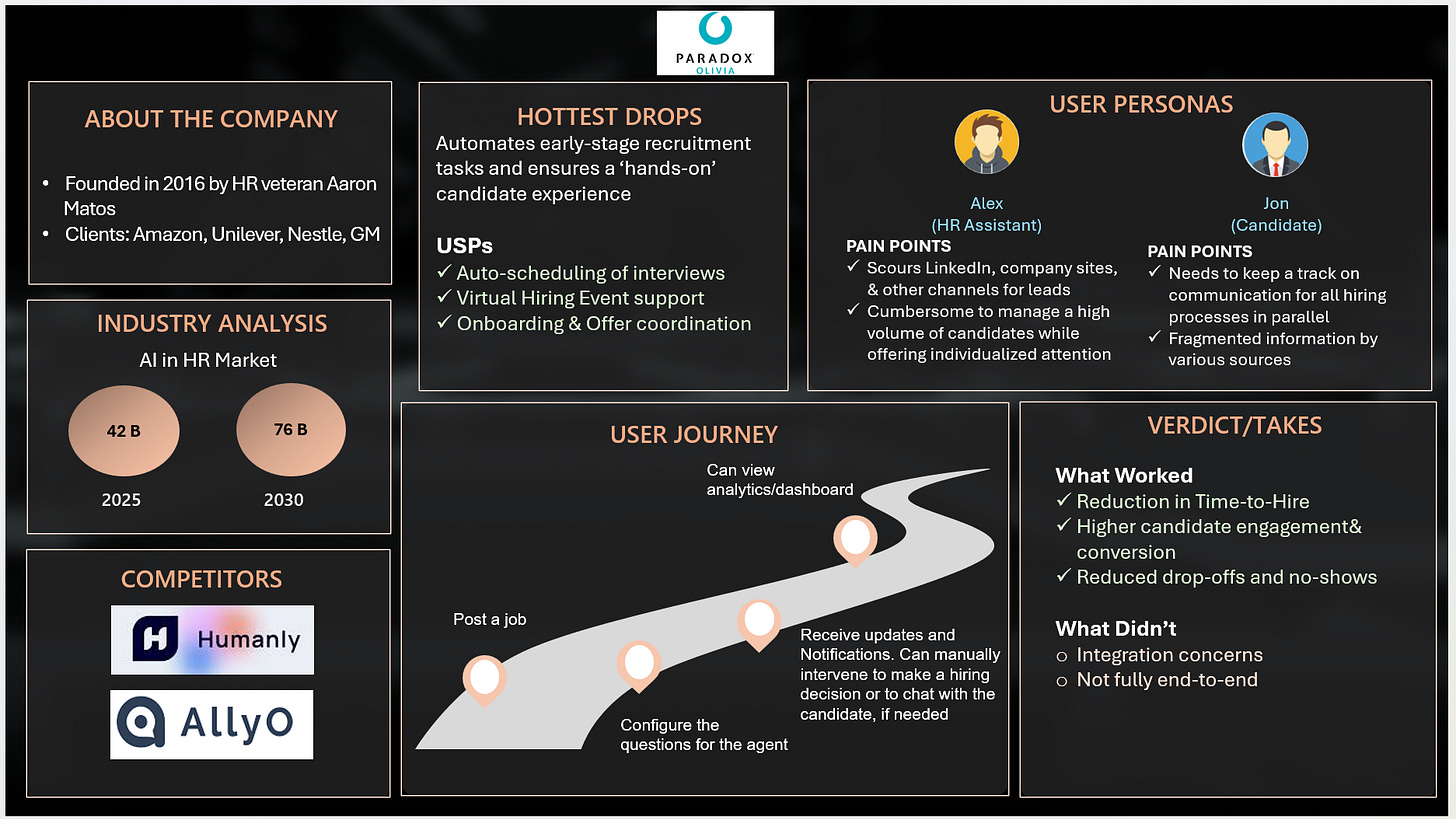PARADOX
Paradox is an HR technology company that builds AI agents for recruiting. Founded in 2016 by HR veteran Aaron Matos, Paradox has now scaled to over 400 employees globally and achieved unicorn status with a $1.5B valuation as of its 2021 funding round.
Product Overview
The company’s flagship product ‘Olivia’ is an AI agent that aims to improve the hiring experience. Olivia automates time-consuming early-stage recruitment tasks like capturing candidates, screening, Q&A, interview scheduling, and onboarding coordination. This frees up human recruiters to focus on higher-value work and personal engagement.
Case Study: Paradox AI
FEATURES
Intelligent Screening Q&A: Instantly chats with candidates to vet qualifications and filter mismatches. This saves recruiters countless hours previously spent on phone screens or resume triage. Olivia’s screening logic can even leverage integrated assessments (Paradox acquired Traitify, a visual personality quiz tool, to enrich candidate profiles).
Automated Interview Scheduling: One of Olivia’s most lauded features is its ability to schedule interviews automatically. Coordinates calendars, books interviews in minutes, auto-reschedules, and sends reminders. It syncs with recruiters’ and hiring managers’ calendars (e.g., via Outlook or Google) to find open slots. Through the chat, candidates can choose an interview time from the available slots, and Olivia books it instantly, sending calendar invites to all participants. It even handles complex cases like coordinating panel interviews or multiple interview rounds, checking all required attendees’ schedules. The assistant also auto-reschedules if a candidate needs to change times and sends reminder messages before the interview.
Virtual Hiring Event Support: The assistant can facilitate hiring events and career fairs by registering attendees, answering event-related queries, and scheduling on-site interviews. For instance, if a company is hosting a virtual hiring day, Olivia can chat with interested participants beforehand, gather their details, and slot them into interview times during the event. It manages bulk interactions with ease, acting like a digital coordinator.
Onboarding and Offer Coordination: Olivia doesn’t stop at the interview stage but it can extend into post-offer logistics. For companies that choose to use it this way, the bot can assist with offer letter communication and scheduling orientation or first-day details. Once a hire is made, Olivia can remain a POC for the new hire’s questions (e.g. “Where do I upload my documents?”) and ensure they complete pre-boarding tasks. While not every employer uses the chatbot for onboarding, those that do provide a seamless continuum in communication, from candidate to new employee. Assists new hires with post-offer tasks, acting as a helpful guide through first-day prep
In essence, Olivia addresses the friction points on both sides of the hiring equation. Recruiters and HR teams suffer from time inefficiencies and risk of losing candidates Olivia gives them speed and automation. Candidates suffer from poor communication and delays. Olivia gives them immediacy and attention. By acting as an always-available intermediary, the AI assistant improves outcomes for everyone involved in hiring.
User Journey
The user journey for the recruiter is simplified: they post a job and configure the agent’s questions via the Paradox dashboard. After that, they watch candidates enter the pipelineand they receive notifications/updates from Olivia at key points (For e.g. “5 candidates are scheduled for interview next week”). They intervene only when needed to make a hiring decision or to manually chat with a candidate. Everything else is handled by the AI smoothly in the background.
What Worked
Reduction in Time-to-Hire: Across multiple deployments, Olivia has sped up hiring. Real-world case studies show time-to-hire cuts of 50% or more. For example, Madison Reed (a retail beauty company) reported that using Olivia reduced the time from application to interview by 4 days on average. Faster hiring means companies can secure talent before competitors do, and fill critical roles to reduce business impact of vacancies.
Higher Candidate Engagement and Conversion: By keeping candidates engaged via quick chats and updates, companies have observed improved conversion rates in the recruitment funnel.
Recruiter Time Savings (Productivity): By automating up to 90% of initial recruiter-candidate interactions, Olivia frees recruiters to focus on high-value work. A testimonial from a recruiting head stated. With routine tasks offloaded, recruiters can manage more reqs per person. Some teams have reported being able to handle 2-3× the requisition load they could before, or simply getting home on time more often, thanks to the assistant doing the heavy lifting in off-hours.
What Didn’t Work
Some limitations around analytics and edge-case handling still exist, making human oversight important. Cost and fit should be evaluated based on hiring volume and context. With those caveats managed, an HR AI agent like Olivia can be a game-changer in talent acquisition, delivering strong results as seen in multiple case studies.
Final Thoughts
An AI HR Agent can deliver a win-win for both stakeholders: a smoother journey for candidates and a more productive workflow for HR. The paradox here is that we are reimagining hiring via machines while aiming for a more human-centric recruitment journey.



Isn't this the AI that was exposed due to researchers finding out they used the password 123456? Those AI agents are annoying and imped the application process.